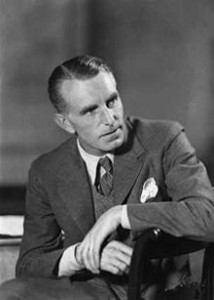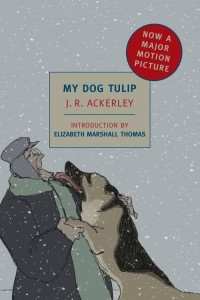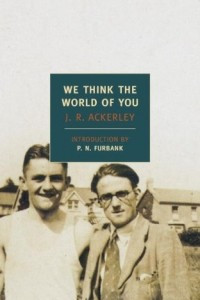-
Жанры
-
Художественная литература
- Приключения 72672
- Фантастика 96064
- Фэнтези 70038
- Детектив 58014
- Ужасы 45793
- Роман 67715
- Классическая литература 59628
- Историческая проза 8072
- Современная проза 138168
- Детская литература
- Культура и искусство
- Научная литература
- История
- Бизнес
- Прикладная литература
- Документальная литература
- Образование
- Дом и семья
- Физическая культура
- Здоровье
- Литература на иностранных языках
-
Художественная литература
- Книги
- Рецензии
- Сообщество
- Блоги
- Цитаты
- Тесты
- Подборки
- Премии
- Конкурсы
- Другое

Джо Рэндолф Экерли
Краткая биография автора
Джо Рэндолф Экерли — британский писатель, редактор еженедельного журнала Би-би-си «The Listener», открытый гей.Автор прозы и драматургии, основанной так или иначе на автобиографическом материале, — в частности, книги «Индийские каникулы» (англ. Hindoo Holiday; 1932, переработанное и дополненное издание 1952), написанной на основе пятимесячной работы секретарём и помощником у индийского магараджи, романа «Мы думаем только о тебе» (англ. We Think the World of You; 1960), по которому был снят одно...
Джо Рэндолф Экерли — британский писатель, редактор еженедельного журнала Би-би-си «The Listener», открытый гей.Автор прозы и драматургии, основанной так или иначе на автобиографическом материале, — в частности, книги «Индийские каникулы» (англ. Hindoo Holiday; 1932, переработанное и дополненное издание 1952), написанной на основе пятимесячной работы секретарём и помощником у индийского магараджи, романа «Мы думаем только о тебе» (англ. We Think the World of You; 1960), по которому был снят одноимённый фильм (1988) с Гэри Олдменом в одной из главных ролей, а также опубликованных посмертно воспоминаний «Мой отец и я» (англ. My Father and Myself), «Моя сестра и я» (англ. My Sister and Myself), мемуаров об Э. М. Форстере, поддержавшем Экерли на заре его литературной карьеры, и др.Именем Экерли названа премия за лучшую автобиографическую книгу, вручаемая ПЕН клубом Англии с 1982 года.was a British writer and editor. Starting with the BBC the year after its founding in 1927, he was promoted to literary editor of The Listener, its weekly magazine, where he served for more than two decades. He published many emerging poets and writers who became influential in Great Britain. He was openly gay, a rarity in his time when homosexuality was forbidden by law and socially ostracized.Ackerley's extramarital half-sister was Sally Grosvenor, Duchess of Westminster. Аckerley's memoir My Father and Myself, begins: "I was born in 1896 and my parents were married in 1919." Registered at birth as Joe Ackerley, he later took the middle name Randolph after an uncle. As an adult, he published under his first two initials and surname.[2] His father Roger Ackerley was a successful fruit merchant known as the "Banana King" of London. (Roger was first married to an actress named Louise Burckhardt, who died young in 1892, probably of tuberculosis, and before they had children).[3]His mother was Janetta Aylward (known as Netta), an actress whom Roger met in Paris; the two returned to London together. They had an intermittent relationship and three years later in 1895, she gave birth to a son, Peter, then Joe a year later, and Nancy in 1899. According to Joe's maternal Aunt Bunny, Peter's birth, and likely all of them, were "accidents." She told him, "Your father happened to have run out of French letters that day," (when Peter was conceived).[4] His father set up a household with his mother starting in 1903, after which the children saw him more regularly.[5] His business did very well and the family had a "butler, a gardener, and, evidently, a very good table." Ackerley was educated at Rossall School, a public and preparatory school in Fleetwood, Lancashire. During this time, he discovered he was attracted to other boys. His striking good looks earned him the nickname "Girlie," but he was not very sexually active as a schoolboy. He described himself as"a chaste, puritanical, priggish, rather narcissistic little boy, more repelled than attracted to sex, which seemed to me a furtive, guilty, soiling thing, exciting, yes, but nothing whatever to do with those feelings which I had not yet experienced but about which I was already writing a lot of dreadful sentimental verse, called romance and love."His father gave him a generous allowance and never insisted that he follow him into business.Failing his entrance examinations for Cambridge University, Ackerley applied for a commission in the Army and went off to the First World War. After the war, he returned and attended Cambridge but never wrote much about it.In October 1929 his father Roger Ackerley died of tertiary syphilis. Shortly afterward, Ackerley found a sealed note from his father addressed to him, which concluded:"I am not going to make any excuses, old man. I have done my duty towards everybody as far as my nature would allow and I hope people generally will be kind to my memory. All my men pals know of my second family and of their mother, so you won't find it difficult to get on their track."Ackerley thus discovered his father had had a second family for more than 20 years. Roger would visit his daughters three or four times a year when supposedly traveling for business, and sometimes when out to walk his first family's dog. His mistress, Muriel Perry, served as a nurse during the First World War and was busy with her career; she seldom saw their three daughters: Sally and Elizabeth, twins born in 1909, and Diana, born in 1912; all were cared for by a Miss Coutts.[5] The birth of the youngest was never registered;but they were all given their mother's surname. Ackerley described the lives of his half-sisters in his 1968 memoir: "They had no parental care, no family life, no friends." For years, the girls thought his father Roger was their much-loved "Uncle Bodger", who occasionally brought them gifts and money.Joe looked after his father's second family without telling his mother, who died in 1946. For years, Ackerley was obsessed with his relationship with his father, both because of the tension of the son's covert homosexuality and what he described as his father's domineering personality. In his memoir, My Father and Myself (1969), which one reviewer termed the "mystery" of the son on the track of his father, Ackerley speculated that his father had some homosexual experiences as a young guardsman, but never proved it. In trying to understand his father's life, he grappled with his own.In 1975 Diana Perry, then Diana Petre, published a memoir called The Secret Orchard of Roger Ackerley. The term "secret orchard" was Roger's for his second family, used in one of his final notes to his son Joe. As World War I had begun, Ackerley was accepted immediately as a Second Lieutenant and assigned to the 8th Battalion of the East Surrey Regiment, part of the 18th Division, then stationed in East Anglia. In June 1915 he was sent to France. The following summer he was wounded at the Battle of the Somme on 1 July 1916. He was shot in the arm and suffered shards of a whiskey bottle becoming imbedded in his side from an explosion. After lying wounded in a shell-hole for six hours, he was rescued by British troops and sent home for sick-leave.He soon volunteered to go back to the front. As he had been promoted to captain, when his older brother Peter arrived in France in December 1916, Ackerley was his superior officer. He later wrote that the cheerful Peter saluted his brother "gladly and conscientiously."In February 1917, Peter was wounded in action on a dangerous assignment. Though he got back to the British lines, Ackerley never saw his brother again, as he was killed on 7 August 1918, two months before the end of the war.] Peter's death haunted Ackerley all his life; he suffered from survivor's guilt.In May 1917 Ackerley led an attack in the Arras region where he was wounded, this time in the buttock and thigh. While he was waiting for help, the Germans arrived and took him prisoner. As an officer, he was assigned to an internment camp in neutral Switzerland, which was relatively comfortable. Here he began his play, The Prisoners of War, which expresses the cabin fever of captivity and his frustrated longings for another English prisoner. Ackerley was not repatriated to England until after the war ended. After the war, Ackerley attended Cambridge. He moved to London after graduation, where he continued to write and enjoyed the cosmopolitan capital. In 1923 his poem was included in a collection of young British writers, so he began to get recognition.He met E. M. Forster and other literary bright lights, but was lonely despite numerous sexual partners. With his play having trouble finding a producer, and feeling generally adrift and distant from his family, Ackerley turned to Forster for guidance. Forster arranged a position as secretary to the Maharaja of Chhatarpur, whom he knew from writing A Passage to India.Ackerley spent about five months in India, which was still under British rule. He developed a strong distaste for the several Anglo-Indians he met. Ackerley's comic memoir Hindoo Holiday explores some of his experiences. The Maharaja was homosexual, and His Majesty's obsessions and dalliances, along with Ackerley's observations about Anglo-Indians, account for much of the humor of the work.[citation needed] During these months, he developed sexual relationships with the 20-year-old Narayan and 16-year-old Sharma, servants of the maharaja.In England, Prisoners of War was finally produced in 1925, to some acclaim. Its run began at The Three Hundred Club on 5 July 1925, then transferred to The Playhouse on 31 August. Ackerley enjoyed his success, returning to London to carouse with its theatrical crowd. Through Cambridge friends, he met the actor John Gielgud, and other rising stars of the stage.In 1928, Ackerley joined the staff of the British Broadcasting Corporation (BBC), then a year old. He worked in the "Talks" Department, which arranged radio lectures by prominent scholars and public figures, and helped create the new organization, which had extensive influence on British literary and cultural life. In 1935 Ackerley was selected as Literary Editor of the BBC's magazine, The Listener, and his work with it was the mainstay of his career; he served in this position for more than two decades until 1959. During this time, he discovered and promoted many young writers, including Philip Larkin, W. H. Auden, Stephen Spender, and Christopher Isherwood. Ackerley was one of Francis King's two mentors (the other being C. H. B. Kitchin)
На нашем книжном сайте Вы можете скачать книги автора Джо Экерли в самых разных форматах (epub, fb2, pdf, txt и многие другие). А так же читать книги онлайн и бесплатно на любом устройстве – iPad, iPhone, планшете под управлением Android, на любой специализированной читалке. Электронная библиотека КнигоГид предлагает литературу Джо Экерли в жанрах .
Творчество Джо Экерли
На нашем сайте представлены 2 книги автора Джо Экерли. Самая популярная по мнению наших читателей "".
MORE BY J. R. ACKERLEY, ELIZABETH MARSHALL THOMAS The distinguished British man of letters J. R. Ackerley hardly thought of himself as a dog lover when, well into middle age, he came into possession of a German shepherd. To his surprise, she turned out to be the love of his life, the “ideal friend” he had been searching for in vain for years. My Dog Tulip is a bittersweet retrospective account of...
Frank, the narrator, is a middle-aged civil servant, intelligent, acerbic, self-righteous, angry. He is in love with Johnny, a young, married, working-class man with a sweetly easygoing nature. When Johnny is sent to prison for committing a petty theft, Frank gets caught up in a struggle with Johnny's wife and parents for access to him. Their struggle finds a strange focus in Johnny's do...

Если у Вас возникли вопросы по работе сайта - напишите нам!
нашли ошибку на странице!

Нейросеть ориентируется на оценки прочитанных вами книг
поиск

Найдите книгу, автора, подборку, издательство, жанр, настроение или друга на Книгогид
подборки

Создавайте подборки с книгами, которые вы прочитали, подписывайтесь на подборки интересных пользователей.
Регистрируясь, вы соглашаетесь с нашими Условиями и политикой конфиденциальности
Книгогид использует cookie-файлы для того, чтобы сделать вашу работу с сайтом ещё более комфортной. Если Вы продолжаете пользоваться нашим сайтом, вы соглашаетесь на применение файлов cookie.



